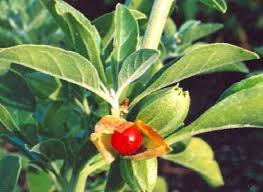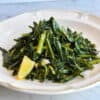 Today I want to tell you about an herb that calms you down when you feel stressed and boosts your energy when you feel fatigued. This herb is Ashwagandha. There is lots of scientific evidence showing the healing benefits of ashwagandha for our endocrine system (hormones). This is why I include it in my Nourishing Foods Winter Cleanse.
Today I want to tell you about an herb that calms you down when you feel stressed and boosts your energy when you feel fatigued. This herb is Ashwagandha. There is lots of scientific evidence showing the healing benefits of ashwagandha for our endocrine system (hormones). This is why I include it in my Nourishing Foods Winter Cleanse.
In this cleanse we support one of the major glands in our endocrine system, the adrenal glands. Your adrenals are responsible for your fight or flight response and are essential for your metabolism. Your adrenal glands control DHEA which is one of you buffers against stress and aging. They produce adrenalin which allows for strength, dopamine the neurotransmitter of reward and the hormone we hear so much about cortisol. If you want to feel healthy and energized it is important for your adrenals to be working well. Supporting the adrenals is what we are doing in the Nourishing Foods Cleanse which starts on Monday Jan 12, 2015
In this cleanse we will be delving into the health of our adrenal glands and the organ they are connected to, the kidneys. You will learn how to support your adrenals not just for the 5 days of the cleanse but for the rest of your life.
During the holidays most of us stress our adrenals, staying up late and eating foods that may not be the best thing for us. That’s OK, we can let it go, we had some fun. As long as we take steps to come back into balance it is not a problem. This is what we do in the Winter Cleanse.
Unfortunately you live in a stressful world not only during the holidays. Knowing how to support your powerful adrenal glands will allow you support your body to have more energy and better health. Click to find out more about the cleanse and to sign up. The early bird discount ends today.
In this post, I want to tell you about Ashwaghandha which is used for adrenal and thyroid support. Whether you join the cleanse or not, I invite you to think about incorporating the miraculous variety of healing benefits granted by ashwaganda.
To get you started, let’s take a quick look at ashwagandha, the benefits of consuming it and just how you go about doing so.
In Sanskrit Ashwagandha means “the smell of a horse”. No, that doesn’t mean it will make you smell like a horse. Some say the name indicates the herb will give you the “strength and vigor of a stallion”. Others say it is the “horse like” smell of the root. I like thinking it will give me energy to run like a magnificent horse.
Ashwagandha is a shrub native to the dry regions of India, Africa and the Middle East. Today it is also grown in the mild, dry areas of the United States. The plant has oval leaves with yellow flowers that bear red fruit about the size of a raisin. The root and sometimes the berries are used to make medicine.
In Ayurvedic medicine ashwagandha is describe as “Indian ginseng” because it’s rejuvenating properties are similar the Chinese ginseng but botanically the plants are not related. It is part of the nightshade family like tomatoes and eggplants.
What Is An Adaptogen?
Adaptogens are a special group of herbs that have the unique ability to “adapt” to your body’s specific needs. What that means is, if you are fatigue they give you a gentle lift without a rush or jolt. On the other hand if you are anxious or nervous they calm you down.
Scientist are not really sure how adaptogens work, but hundreds of studies show they balance the endocrine system, (hormonal) to help you feel better whether you are up or down. For example someone could take ashwagandha to boost sluggish adrenals but another person could take it to modulate overactive adrenals. They normalize the body’s imbalances. They are quite amazing.
Common symptoms that have been shown to improve using Ashwagandha are:
- Stress
- Fatigue
- Lack of energy
- Trouble concentrating
Most of these symptoms are connected to our adrenal system. In the Nourishing Foods Winter Cleanse we will use ashwaganda, other adapotgens, certain foods and practices to support our adrenals.
Healing Benefits of Ashwagandha
Scientists have done over 200 studies on the healing benefits of ashwagandha. Here are some of the most beneficial effects you can expect:
- Protects the immune system
- Helps combat the effects of stress
- Improves learning, memory, and reaction time
- Reduces anxiety and depression without causing drowsiness
- Helps reduce brain-cell degeneration
- Stabilizes blood sugar
- Helps lower cholesterol
- Offers anti-inflammatory benefits
- Improves libido for both men and women.
Ashwagandha can be found in capsule, powder or as a tincture.
The recommended dose is 600 to 1000 mg twice a day. But with anything new I recommend starting small then see how you feel to determine what dosage works best for you .
You can find ashwagandha in most health food stores. Ask them which brand they recommend. I usually buy the tincture and put it into a glass of water. I have it mid-morning and then at lunch.
If you suffer from insomnia, some Ayurvedic doctors recommend have a teaspoon of powdered ashwagandha in milk before bed. If you don’t drink milk you can have it with some hemp or almond milk.
Even though ashwagandha is very gentle, any herb or adaptogen is best taken for a limited time and then give your body the chance to balance on it’s own.
Caution: Avoid during pregnancy or if you are taking sedatives or if you have severe gastric irritation or ulcers. Also people who are sensitive to the nightshade group of plants should be careful. Always consult with your health care practitioner before taking any herbs or supplements.
What is your experience with Ashwagandha?





